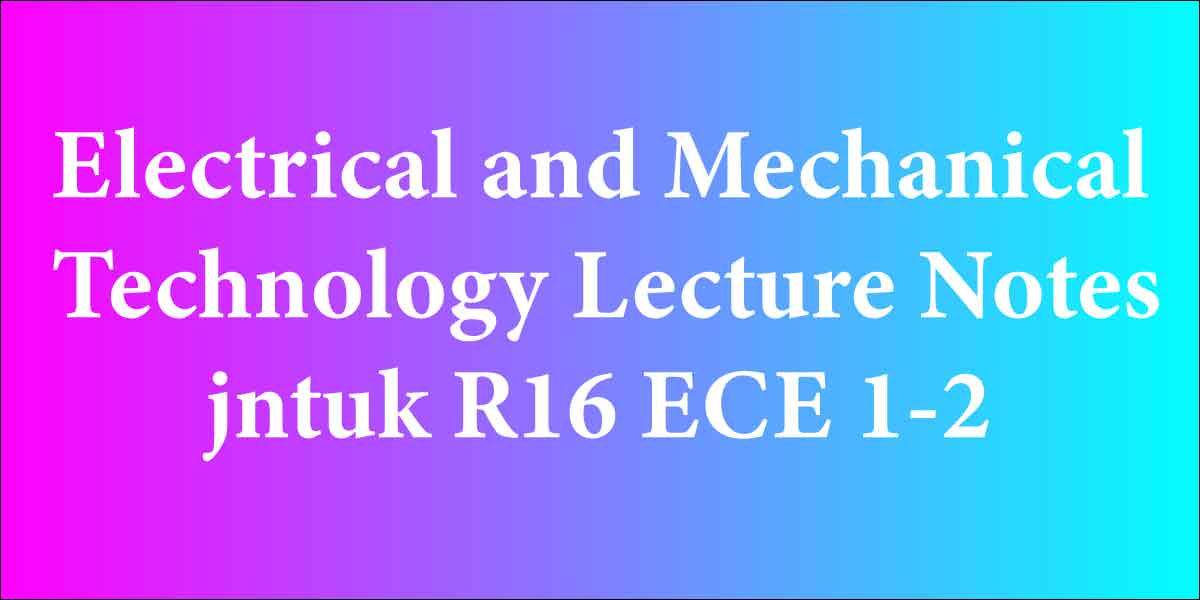Electrical and Mechanical Technology
ELECTRICAL TECHNOLOGY:
Preamble: This course covers the topics associated with analysis of varied electrical circuits, operation of varied electrical machines, numerous electronic parts to perform well in their various fields.
Learning Objectives: • to be told the essential principles of electrical law’s and analysis of networks. • to know the principle of operation and construction details of DC machines. • to know the principle of operation and construction details of electrical device. • to know the principle of operation and construction details of generator and 3-Phase induction motor. • to know the principles and construction of varied measure instruments.
Unit – I
DC Machines: Principle of operation of DC generator – electrical phenomenon equation – kinds of DC machine – force equation of DC motor – applications – 3 purpose starter, speed management ways – OCC of DC generator Transformers: Principle of operation of single section transformers – e.m.f equation – losses –efficiency and regulation.
Unit – II
AC Rotating Machines: Principle of operation of alternators – regulation by synchronous electric resistance methodology –principle of operation of 3Phase induction motor – slip-torque characteristics – potency – applications.
Unit III
measure Instruments: Classification – Deflection, dominant, damping force, ammeter, voltmeter, wattmeter, MI, megahertz instruments – Energy meter – Construction of cathode-ray oscilloscope.
Learning Outcomes: • ready to analyse the assorted electrical networks. • ready to perceive the operation of DC generator, DC Motor ,3-point starter and Speed management ways. • ready to analyse the performance of electrical device. • ready to make a case for the operation of 3-phase generator and 3-phase induction motors. • ready to make a case for the regulation of varied measure instruments.
I Year – II Semester
L T P C
4 0 0 3
ELECTRICAL & MECHANICAL TECHNOLOGY
MECHANICAL TECNOLOGY Learning Objectives: The content of this course shall give the coed the essential ideas of varied mechanical systems and exposes the coed to a good vary of kit and their utility in a very sensible state of affairs. It shall give the basic principles of fuels, I.C. Engines, transmission systems, heat transfer fundamentals and numerous producing operations typically exist in any method plant.
UNIT-IV:
Energy Sources: Renewable and non renewable energy resources, renewable energy forms and conversions. physical science principles and laws.
Internal combustion engines: classification – regulation – engine parts. Four stroke and 2 stroke hydrocarbon and diesel engines, comparisons. Performance parameters: informatics, BP, FP, SFC, BTE, ITE, ME.
UNIT-V:
Heat Transfer: Modes of warmth transfer- heat transfer parameters, numerous thermo physical properties. conductivity – heat transfer for extended surfaces, kinds of fins, Fin equation for rectangular fin, Fin potency, Fin effectiveness. Convection – Mechanism, Natural and compelled Convection. Heat Transfer in bedded and flow over a flat plate. Radiation heat transfer: Thermal radiation, black-body radiation, Radiation intensity, Radiative properties, Basic laws of radiation.
UNIT-VI:
Transmission of power and producing methods:
Belt, rope and chain drives- differing types – power transmission by belts and ropes, initial tensions within the belt.
Gears: classification of gears, applications.
Metal joining: arc fastening, resistance fastening, gas fastening, brazing and bonding Metal forming: shaping – operations, rolling and extrusion principles Machine tool: shaping machine classification, specifications, and operations.
Outcomes:
when finishing the course, the coed shall be ready to understand: • operating of I.C. Engines • Modes of warmth transfer • Power transmission by drives and totally different producing ways.
Text Books:
- Electrical Technology by Surinder Pal island, Pearson Publications. 2. electric circuit Theory and Technology by John Bird, Routledge Taylor &Francis cluster three. applied science Science K R Gopala Krishna, Subhas publications
- parts of applied science, M.L. Mathur, F.S.Metha & R.P.Tiwari religious belief Brothers Publs., 2009. 5. Heat transfer by P.K. Nag, Tata McGraw-Hill
Reference Books: one. Basic EE by M.S.Naidu and S.Kamakshiah, TMH Publications a pair of. Fundamentals of EE by Rajendra Prasad, alphabetic character Publications, second edition three. Basic EE by Nagsarkar, Sukhija, Oxford Publications, second edition four. EE – Prasad, Sivanagaraju, Cengage Learning five. Theory of machines by Rattan McGraw-Hill publications six. Production Technology by P.N.Rao by I & II McGraw-Hill publications

